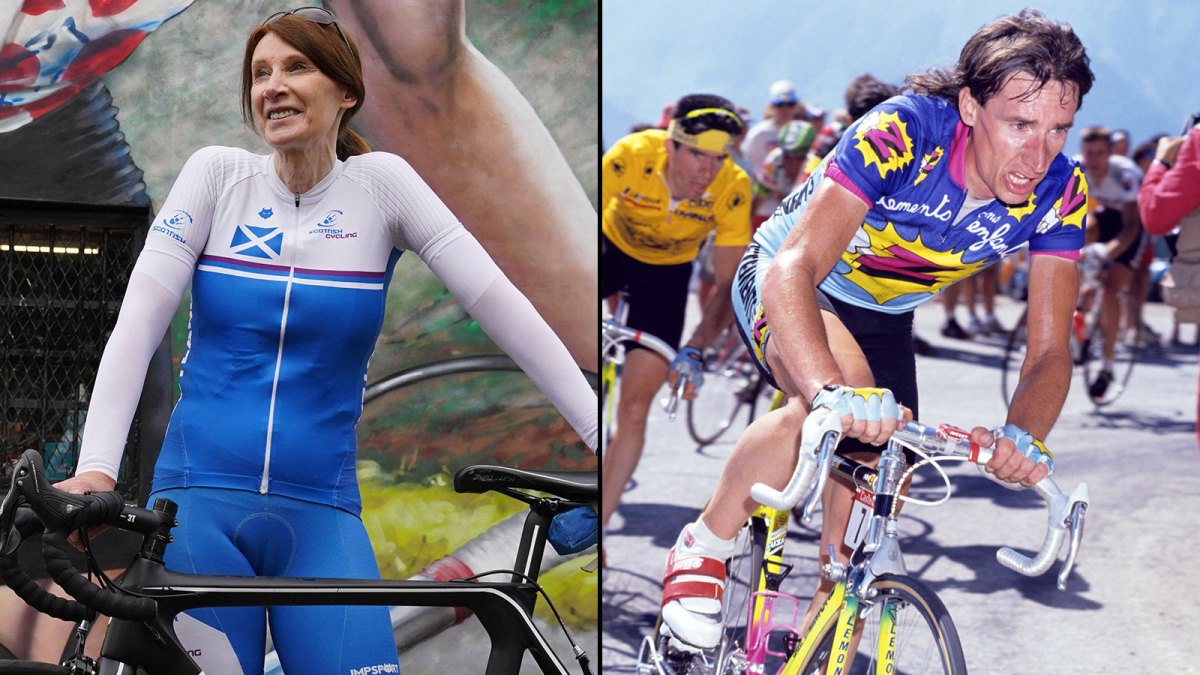As Robert Millar, she was Scotland’s most successful road cyclist, the King of the Mountains in the Tour de France.
Now Pippa York, who transitioned a quarter of a century ago, has suggested her astonishing career as a male athlete would never have happened if she’d had access to puberty blockers as a teenager.
York, 67, is one of a small number of trans women who talks about her old identity, who “dead names” herself. That is because she was just too famous.
She made clear to Kelly-Ann Woodland, the STV news presenter, that there would have been no Robert Millar if she could have had access to gender-affirming medical care when she was a child.
“I would have transitioned as a teenager. I wouldn’t have been Robert Millar, the cyclist. I would have been Pippa doing something else,” she said. “If I was a young person nowadays, I would have been that teenager who was transitioning at the age of 13 to 14. I would be the person affected by the puberty blockers debate … and not able to access that medication.”
Millar competed in the Tour de France 11 times, finishing fourth in 1984 and becoming the first Scot to win the King of the Mountains title and the coveted polka-dot shirt.
York told STV the shirt would not have come to Scotland if she had been able to transition when she was young. She knew she was different from a very young age, even when competing.

Robert Millar was the first Scot to win the “King of the Mountains” title
COLIN MCPHERSON/CORBIS VIA GETTY IMAGES
“There would be some days where it would be difficult, where I’d have a lot of dysphoria,” she said. “But in the competition world, you can bury it. You remove all emotions from your life. I put on my competition face and turned into this beast. I just tried to block it all out.
“I got to about the age of 25, 26, and became fully aware of what my issues were going to be. And I realised the world I was in. It wasn’t going to happen. So I invested myself even more in my cycling. That way, when I finished, I had options where I didn’t necessarily have to be a public figure any more.
“You go from being someone everyone admires, to being at the bottom of the pile again. It’s a fight for respect and dignity. It’s quite a social shift.”
• My friend Pippa — who used to be one of Britain’s best male cyclists
Scotland has about 3,000 trans women, according to the last census. York stressed how rare they were and said she had never met another trans person in changing rooms or showers or toilets. The former athlete, who now lives in England, has no problems with trans people taking part in sport in their chosen gender.
“There are so few trans athletes, and they never win. Remind me what the 100m record is for a trans person? There isn’t one,” she said. “The physical and mental effects of transitioning mean you’re very unlikely to be competitive at an elite level. It’s one in millions to make it to the top, and there just aren’t millions of us.
“Show me where it’s not fair. Three trans athletes have competed at the Olympics in 25 years. They didn’t win. One came last.
“People don’t realise the level of women’s sport. It’s not easier. It’s slightly slower in some events, but that doesn’t make it less competitive or less difficult.
“Your hormonal system runs your health. After the transition, the system that repairs muscle with protein no longer works the same. You hurt yourself training and don’t recover. And you lose that competitive edge that testosterone gives you.”
Asked about Scotland’s Gender Recognition Act, which was blocked by the UK government, York said: “I don’t know why they fiddled with it.”
She added: “The system was working well enough. Self-ID exists in other countries like Spain, Scottish people go there on holiday, and it’s not an issue. It was a waste of time, a distraction. Is my existence an issue? Because to me, it’s just not a thing.”

